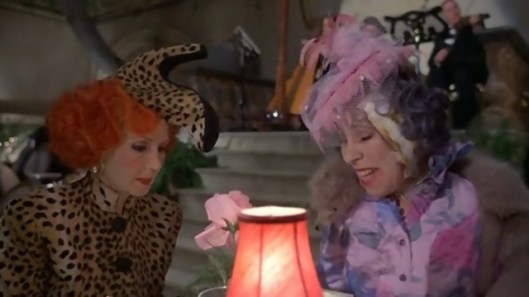An entry in a periodic series of reviews of films celebrating milestones in 2015
Brief Review: Terrorism, state torture, the ease at which our humanity can be manipulated away and clinging to the hope that escaping into dreams of love can break us free. I wish I could say its themes are dated. Brazil is still visually stunning. There may be a handful of better dystopian films, and certainly ones that pack more thrills, but since the root social problems that the movie explores are still with us, Brazil remains a vital expression of our fears of the present.
Rating
Release Date: February 22, 1985
Synopsis: A petty clerk in a faceless bureaucracy searches for the woman he rescues in his dreams each night in Terry Gilliam’s darkly comic masterpiece about a society that has normalized inhumane values.
Four Anniversary Questions
What’s to Like?
- The set design and production. Every scene points to a society that has inverted its values, or at least is indifferent to humanity, yet holds onto the illusion that it is upholding normal behavior. All of the technology seems to be designed without people in mind. Duct-work that should be behind walls or ceilings is out the open and in the way. Toasters that do not toast. Computer screens that distort images so that they are difficult to see. Double paned window glass that no one can see through. Haute cuisine that is nothing but various colors of tuna salad. Christmas wreaths on torture chamber doors. Everything is either vulgar, cruel, compromised, unjust or frustrating. Yet no one seems to notice, or at least tries not to notice.
- Roger Pratt’s cinematography: The film itself is shot almost void of color with heavy use of shadow to cover faceless supernumeraries, which emphasizes that we don’t care about these people. Colors when they do appear, are related to the vulgar tastes of the social elite. The sudden shifts in perspective add to the theme of distorted information.
- The cast. Jonathan Pryce, Robert De Nero, Katherine Helmond, Bob Hoskins, Ian Richardson, Michael Palin, Jim Broadbent…and so many others. When I first watched this movie was not yet aware of many of these actors. When I watched it 30 years on, I was amazed at the number of familiar faces. Gosh, I hope Katherine Helmond is doing well.
- The subtlety of its humor and critique. Brazil is a “show me” not a “tell me” movie. For the most part, everyone is playing their roles straight with slight comedic exaggeration, given the circumstances. Gilliam had faith in his audience to recognize the perversity of his film’s setting. No one stops to give a speech that sums up the critique, so it is never preachy. The best we can say for the “hero”, Sam Lowry (Pryce), is that he eventually shows concern for someone else. In the end he too escapes into a dream world that only differs in intensity from his self-absorbed mother’s (Helmond) dream that she can stay young forever.
What’s Not to Like?
- While it is interesting to listen to Aquarela do Brasil played in as many ways possible, after a while, it becomes more tiresome than engrossing.
- Some (not all) of the effects and action sequences are dated, especially in the car chase scene and dream sequences. The attempts at action aren’t that exciting.
- For some reason, the sex scene between Pryce and Kim Geist seemed forced. I’m not certain when or why Jill fell for Sam.
Is it Still “Fresh?”
- Yes. The issues of social distortion, terrorism, and torture are still with us, is our attempt to flee into dreams to help avoid having to acknowledge social cruelty. The film does not make an attempt to predict the future. Instead it is a commentary on the current state of the world. It doesn’t matter if we drive more comfortable cars, have more convenient phones or “Suspicion breeds Confidence” never caught on as a corporate slogan. Our world still remains closer to Brazil than we’d care to admit, and could slip there without us noticing.
Should it be Remade, Updated or Sequel-ed?
30 years is a long time in the film world, and classic films are easily forgotten, but I do not see compelling reasons for a remake or an update. I suppose there could be a sequel. Sam could wake up from his torture induced dreamworld, but he would probably find the exact same world he left behind. He isn’t enough of a hero for me to want to see him again in more of the same adventures. I’m having a difficult time imagining what a sequel would be about.
Verdict
Classic. Worth a second viewing in it’s anniversary year. Essential watching for those who missed it the first time.


